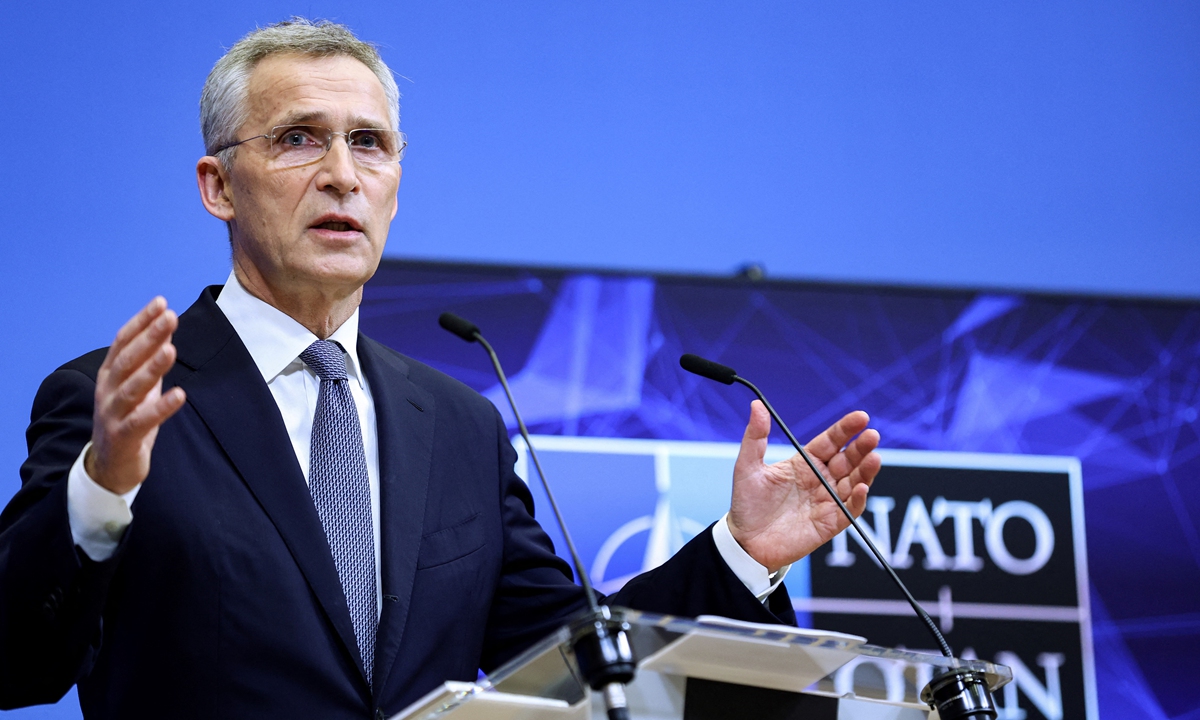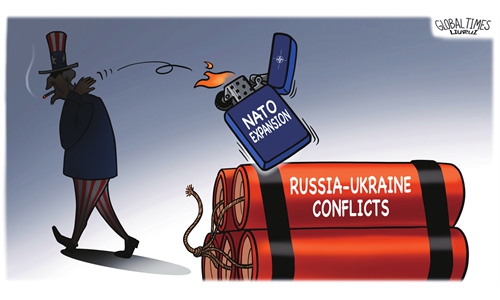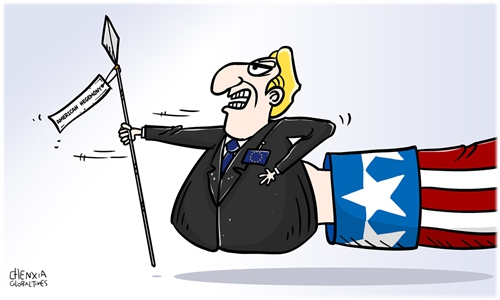
NATO Secretary General Jens Stoltenberg speaks during a press conference ahead of the alliance's Defence Ministers' meeting at the NATO headquarters in Brussels on March 15, 2022. Photo: AFP
NATO Secretary General Jens Stoltenberg hyped the "China threat" in his press conference on Tuesday, a day before the NATO foreign ministers' meeting. He said China's "coercive policies on the global stage… pose a systemic challenge" to NATO's security and democracies. He said NATO's next Strategic Concept will "for the first time… take into account China's growing influence." He also said the bloc will seek to enhance cooperation with "Asia-Pacific partners."Stoltenberg's remarks revealed the US' strategic intent. After putting forward the Indo-Pacific Strategy, the US began to feel its incapableness, particularly that the strength of its allies in the Western-Pacific region is not enough to support its ambitions. It needs more hands or, in other words, hatchet men. For this reason, the US hopes to drag the entire NATO into its Indo-Pacific layout.
The abovementioned developments of NATO indicate that the US does not deflect its attention to China despite the Ukraine conflict. Rather, as Washington has successfully mobilized its allies and Ukraine to engage in a desperate fight with Russia and wooed allies and partners to besiege the Russian economy in longer terms, it is likely that Washington would like to focus its attention on China.
Constantly creating enemies by labeling other countries as dangerous, NATO tries to strengthen unity to better coordinate with the US military strategy. However, Wei Dongxu, a Beijing-based military expert, believes not all NATO members will blindly follow the US. Washington tries to make its rival the common adversary of NATO, but turning against China militarily is clearly against the interests of some NATO members, which have close relations with China.
"NATO is already deeply divided. Making enemies outside will create only a fleeting illusion of unity and is unlikely to bridge the divisions among its members. For example, the AUKUS deal between the US, the UK and Australia made some European countries distrust US military strategies and strategic propositions," Wei said.
Through US moves to set up "small circles" in recent years, more countries perceive NATO as a tool of the US. The military provocations by the US and its allies in the Indo-Pacific region are highly repugnant to most countries. If the US and its allies have more aggressive intentions there, it may intensify some existing regional hot spots and bring more instability and uncertainty - and more countries are likely to raise objections.
China, according to Wei, should strengthen its cooperation with neighboring countries on one hand, while increasing its own national defense and military capabilities on the other. China must have the ability, confidence and determination to respond to any external provocation or interference, especially those aimed at infringing on China's core interests. Continuously increasing pressure on China has become the US' basic China policy. China must be prepared to bear the pressure and create more tools to break US pressure.
"The US has repeatedly set up strategic traps for China. But China will stick to its own pace rather than dance to Washington's tune," Wei noted. China will take corresponding precautions and countermeasures according to the degree of harm caused by military actions by the US and NATO in the Indo-Pacific region.
In the early 1990s, the US promised that NATO would move not one inch to the east. However, as the initiator to the Ukraine crisis, US-led NATO has expanded eastward five times since 1999. Those expansions are seen as one trigger of the ongoing conflicts between Russia and Ukraine.
As a matter of fact, the US and NATO have repeatedly infringed so-called rules-based international order. Wei thought that China should strive more to make friends with Southeast Asian countries through some regional cooperation mechanism and make them more aware of the dangers of the US and its allies' military presence in the region.


